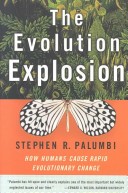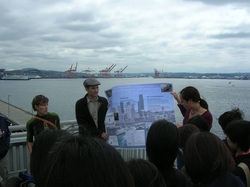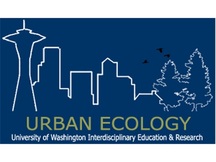Teaching Philosophy
I enjoy teaching a variety of science courses, and see my role as primarily to guide students in their learning process. I try to consider the needs of my students individually, but also for each course the needs of the class as a whole. I display my enthusiasm for natural sciences by being an active, dynamic leader inside and outside the classroom. I believe that teaching students critical thinking and information literacy—skills that enable them to discover, assess, synthesize and integrate information and evidence on their own—is critical. In addition, taking an active and interdisciplinary approach to evaluating and solving environmental issues as part of the curriculum prepares students for contributing to their communities in the future.
Some of the fundamental principles of my teaching philosophy are:
Some of the fundamental principles of my teaching philosophy are:
- Using cooperative learning techniques and a variety of teaching methods in every course
- Creating a safe and respectful classroom environment for interdisciplinary and multicultural learning
- Creating contextualized learning experiences by relating course concepts to current issues and my students’ lives
- Reflecting on how my students are learning and how to be a more effective teacher
- Pursuing pedagogical innovation by participating in the scholarship of teaching and learning
The Evergreen State College
202:
Previous:
Fall 2016: graduate Conceptualizing our Regional Environment (gCORE)
Winter 2017: Restoration Ecology
Spring 2017: Research Design & Quantitative Methods
Fall 2017: Case Studies and Thesis Design
Winter 2018: Urban Ecology (see the student-contributed projects at the MES Urban Ecology site)
Spring 2018: Research Design & Quantitative Methods
Fall 2018: Case Studies and Thesis Design
Winter 2019: Landscape Conservation, Management & Design
Spring 2019: Research Design & Quantitative Methods
Fall 2019: Case Studies and Thesis Design
Winter 2020: Urban Ecology (see the student-contributed projects at the MES Urban Ecology site)
Spring 2020: Research Design & Quantitative Methods
In 2020-2021 I served as the Acting Director of MES
Fall 2020: graduate Conceptualizing our Regional Environment (gCORE)
Winter 2021: MES Thesis Workshop
Spring 2021: MES Thesis Workshop
Florida International University
Spring 2012: PCB 3043, Ecology. 150 students, lecture course.
Spring 2013, 2014: ZOO 3303, Vertebrate Zoology. 100 students, lecture course.
Fall 2014: PCB 4932 Topics in Ecology: Urban Ecology
Spring 2015 & Fall 2015: ZOO 3303, Vertebrate Zoology
Spring 2016: Ecology
Spring 2013, 2014: ZOO 3303, Vertebrate Zoology. 100 students, lecture course.
Fall 2014: PCB 4932 Topics in Ecology: Urban Ecology
Spring 2015 & Fall 2015: ZOO 3303, Vertebrate Zoology
Spring 2016: Ecology
Lewis & Clark College
Visiting Assistant Professor of Biology, 2008-2009

BIO 100: Perspectives in Biology (lecture and lab). This is the main biology course for non-majors at Lewis & Clark, with the focus determined by the instructor. Many students use Bio 100 for their science requirement, so there are students with a variety of backgrounds and experience. I used a variety of readings, including chapters from Stephen Palumbi's The Evolution Explosion. From my syllabus:
BIO 335: Ecology (lecture and lab). This is an upper-division course for Biology majors only. I taught this in Spring 2009 with 15 students total. I followed the general structure of the course as taught by Professor Bierzychudek, but emphasized somewhat different topics. I used the Cain, Bowman and Hacker Ecology textbook. From my syllabus:
- The main purpose of this course is to introduce you to the ways that biologists study the world. Our focus this semester is on modern evolutionary change, in particular changes resulting from the actions of humans. You will learn about evolutionary biology through case studies including antibiotic resistance in bacteria, resistance of weeds to herbicides and insects to insecticides, and changes observed in populations of birds (due to urbanization), fish (due to fishing) and large mammals (due to trophy hunting). Labs will include observations and activities in the field, as well as laboratory work.
BIO 335: Ecology (lecture and lab). This is an upper-division course for Biology majors only. I taught this in Spring 2009 with 15 students total. I followed the general structure of the course as taught by Professor Bierzychudek, but emphasized somewhat different topics. I used the Cain, Bowman and Hacker Ecology textbook. From my syllabus:
- Ecology is the study of the interactions between organisms and their physical and biological environment. In your introductory course you have been exposed to the fundamentals of ecology. This is an advanced ecology course and emphasizes the skills and abilities that professional ecologists use: crafting a researchable question, designing experiments, interpreting data, retrieving and synthesizing existing knowledge and information, building models, using statistical analyses, critiquing others' (and your own) work, and communicating effectively. Although some of you may go on to be an ecologist, these skills will be valuable no matter what path you take in your career.
University of Washington
Capstone Instructor, Program on the Environment, 2005-2007

Program on the Environment is the University of Washington's home for an undergraduate environmental studies major (and minor) and a graduate certificate in Environmental Management. PoE is explicitly interdisciplinary and draws on faculty and courses across the UW campus. Environmental studies majors take a set of core courses offered by PoE, and as seniors complete a project known as their 'Capstone Experience,' which can take the form of an internship, participating in faculty research, or developing an independent project while studying abroad. I was Capstone Instructor for two academic years, teaching the following courses:
ENVIR 490: Pre-Capstone Seminar (Autumn 2005, Spring 2006, and Autumn 2006). First quarter of Capstone sequence (class met once/week). I developed contacts with community groups, environmental agencies and non-profits, and UW faculty for potential Capstones. I guided students' development of their researchable question, annotated bibliography, and learning contract, in concert with their site supervisors and faculty advisors.
ENVIR 491: Capstone Experience (Winter 2006, Summer 2006, and Winter 2007). Second quarter of Capstone sequence (no class meetings). I monitored student progress through their Capstone project, and communicated with site supervisors and faculty advisors as needed.
ENVIR 492: Post-Capstone Seminar (Autumn 2005, Spring 2006, and Autumn 2006). Third and last quarter of Capstone sequence (class met twice/week). I guided students through writing an analysis of the Capstone project and preparation of a poster or talk for the Capstone Conference. In many class meetings I led discussion of topical environmental readings. I also organized and developed classes on career options and preparation.
Urban Ecology Instructor (Winter 2005 and Winter 2006)

As part of my interdisciplinary graduate program in Urban Ecology, I developed and team-taught an introductory course with eight other graduate students. This course presented two different interdisciplinary challenges: 1) to design a course as part of an interdisciplinary team, and 2) to teach a course, without prerequisites, that included widely varying topics from social justice to terrestrial ecology
ENVIR 220 (Winter 2005): Urban Ecology, Interdisciplinary Perspectives. I played the role of lead instructor in this course while collaborating on all aspects of instruction. From the syllabus:
BES 397 (Winter 2006): Special Topics in Environmental Science: Urban Ecology. One year later, I taught Urban Ecology again at UW, Bothell, this time as the sole instructor, in their Interdisciplinary Arts & Sciences program. I modified the course based on evaluations and feedback from the first time around, but kept many of the same activities and lectures.
ENVIR 220 (Winter 2005): Urban Ecology, Interdisciplinary Perspectives. I played the role of lead instructor in this course while collaborating on all aspects of instruction. From the syllabus:
- Urban Ecology introduces the concept of examining human and natural systems within a unified, interdisciplinary framework. We will introduce relevant principles from ecology, geography, economics, history, urban studies, and public policy development, and use them to assess case studies of environmental problems and solutions in urban areas.
BES 397 (Winter 2006): Special Topics in Environmental Science: Urban Ecology. One year later, I taught Urban Ecology again at UW, Bothell, this time as the sole instructor, in their Interdisciplinary Arts & Sciences program. I modified the course based on evaluations and feedback from the first time around, but kept many of the same activities and lectures.
